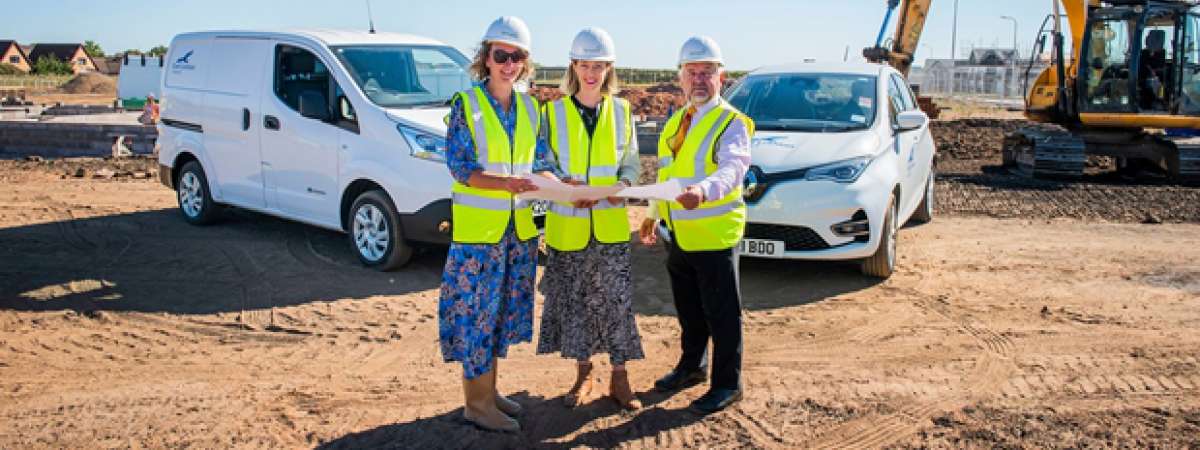
It’s exciting times in the housebuilding market as the Scottish Government promises to legislate to ensure developers provide electric vehicle (EV) charge points in the construction of new residential and non-residential buildings.
In its policy proposals: ‘Scottish Building Regulations: Proposed Changes to Energy Standards including ventilation, heating and electric vehicle charging provision consultation’, the consultation focuses on, and aims to ‘support and encourage the growing uptake of electric vehicles by ensuring that all new homes, including flats, with a dedicated car parking space are built with electric charge points, making charging easier, cheaper and more convenient for drivers’.
In short, any new building regulations must ensure that new residential buildings with a parking space have at least one EV charge point with a minimum 7kW rating. For new non-residential buildings with more than 10 parking spaces, one in every 10 would be expected to provide an EV charge point socket with a minimum 7kW rating.
Additionally, it is expected that there will be the need for residential and non-residential buildings which are, or will undergo major renovation, to provide EV charge points.
The Electric Vehicle Association Scotland, which was involved in discussions on the policy, supports the Scottish Government’s initiative.
Its director, Neil Swanson, said: ‘To encourage even more people to transition to electric vehicles, it is vitally important that drivers have access to home charging as well as an integrated public charging network. As the number of EV registrations continue to rise significantly in Scotland, this legislation will be a significant step towards us meeting our net zero emission targets’.
To launch the proposals, the Minister for Transport, Jenny Gilruth, joined East Lothian Council and housebuilder, Springfield Properties, at Windygoul South in Tranent, East Lothian, to learn more about the work already underway to provide charge points as part of the new housing development.
Gilruth said: ‘We know that it is important to make charging as easy as possible to help make the switch to EV. I’m pleased to confirm that we will introduce legislation to ensure all new buildings are EV enabled. This step will help future proof Scotland’s buildings as we transition to a net zero transport system. This supports our ambition of phasing out the need for new petrol and diesel cars and vans by 2030 as part of our response to the global climate emergency.
‘We’ve already seen private developers delivering EV charge points as part of new builds in Scotland. They recognise that these are an attractive feature to have and offer convenience as part of a wider charging mix. These changes will provide a minimum standard that developers will need to consider going forward.
‘We also know that many households will not have access to dedicated parking spaces and that’s why earlier this year we announced our £60m EV Infrastructure Fund, to ensure that all households across Scotland can be confident that EV charging will be local, accessible and that they too can switch to zero emission.’
Some homebuilders are already ahead of the game, and include cabling for electric car charging in new builds. One Scottish housebuilder, Springfield Properties, is showing a clear lead. Tom Gibbs, their quality, environmental and sustainability manager, commented: ‘Sustainability is at our core across the Springfield Group and we strive to do the right thing across our operations, whether it be the design of our developments, our engagement with stakeholders or in the way we look after our customers and employees.
‘In 2018, when grants for electric charging points were widely available, we decided to include the cabling for electric car charging in all of our houses. With an electricity supply to the most convenient point of the house, typically by the driveway or the garage, the installation of a charging point is less intrusive for our customers for when they decide to make the switch to electric while future proofing their home. And we’re delighted that this includes our affordable development in partnership with East Lothian Council at Tranent. It’s great to see the Scottish Government and East Lothian Council taking further steps to enhance the electric vehicle charging infrastructure as we move towards a greener Scotland.’
The Springfield Group has launched a new purely-electric vehicle company car scheme, as part of wider plans to transition its full fleet to electric. More than half the orders placed since the scheme was launched have been delivered. The group’s Glassgreen Hire plant and transport subsidiary has partnered with Lex Autolease for the new EV offering, which has already seen take-up levels said to be industry-leading.

Comments
By Martin Winlow, 3 years ago
Sorry, but I think this is foolishness. It is one thing to oblige homebuilders, etc, to very cheaply incorporate the necessary wiring to allow an occupier to easily and cheaply install a *suitable* charge point *if they wish*. It is entirely another to *force* builders to install a chargepoint that may be entirely unsuited to the needs of a future EV owner/occupier and will simply mean that millions of pounds will be unnecessarily spent which could be put to much better use.
Beyond a basic supply provision, I would favour a system of a levy being paid which goes into a pot to offer a grant for the supply and fitting of a chargepoint at such time as it is needed. It is all much akin to the perfectly silly idea of forcing every threshold in the land to be level, causing yet more ‘red-tape’ and 99% of the time, wholly unnecessary added cost.